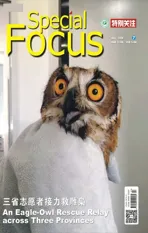Thomas’ 15-Year Search for Taoism
2018-08-03TextbyQiFeiLuoXin
Text by Qi Fei & Luo Xin
Photos by Feng Kaichun
“When I was a child, I often longed for a chance to learn kung fu in China, but frankly it weirded out my parents.”Though born in a small city with little connection to China,Thomas has always had a special and unexplainable feeling towards China.
After college, Thomas began to learn Chinese systematically.The artistic beauty of Chinese characters held limitless appeal for him. In his eyes they were literally imbued with power and artistry. One day, he just happened to read some Taoist literature, and the book aroused in him a latent passion for Taoism, which originated in the mysterious ancient oriental culture. That was when the idea of “Going to China” started lingering in his mind.
“Since the roots of Taoism lie in China, and I can speak Chinese, I want to seek the meaning of life at the birthplace of Taoism.” One day in 2003,Thomas boarded a plane to China and never looked back.
At first, he studied the Taoist classics and learned the fundamental ideas of Taoism in Qingdao, Shandong Province of China. Then he went to Shanghai to study traditional Chinese medicine and qigong(chi kung). According to Thomas, he felt like a child yearning to glimpse more beauty on the path towards a future filled with mystery,romance and excitement.
After graduating from Shanghai University of Traditional Chinese Medicine,Thomas took a trip to the Xianren Cave in Lushan Mountain, and then visited the Temple of the Five Immortals in Shiyan. In 2014, he decided to take up residence in the village of Zixiao Palace in the Wudang Mountains, living there like a hermit.

托马斯寻“道”中国15年
文/齐菲 罗鑫 图/冯开春
今年42岁的托马斯来自法国拉罗谢尔,六七岁时,李小龙的功夫电影是他对遥远东方的最初印象。
“小时候我经常拜托我的父母把我送到中国练功,他们都觉得很奇怪。”出生于这个与中国几乎没什么关联的小城,托马斯对遥远的中国有种莫名的向往。
上大学后,托马斯开始系统地学习中文。在他眼中,汉字魅力无穷,充满了艺术感和生命力。后来,他偶然看到一本关于道家的自传文学,对道家文化这一古老的东方文化产生了浓厚兴趣,“到中国去”的念头开始在他脑海萦绕。
首先依据现行的政策,无法做进项税抵扣的项目有企业的贷款服务项目,其中发生的征询费用或者手续费用需要缴纳的增值税不能抵扣,都由企业自己承担。再者,某些资本和劳动密集型的企业通常每年都要支付大额的利息费用给银行或者金融机构,这些费用也不能抵扣,给企业带来无形的税收负担。还有一些高科技企业技术团队的高薪支出和物流行业的高人力资本同样也无法归入抵扣链条,从而形成税负过重的状况。
“既然道家文化的根在中国,我又会中文,那我就要去它的源头寻找。”2003年,托马斯义无反顾地坐上了飞往中国的航班。
起初,他在山东青岛学习道家典籍和思想,后来在上海学习中医时,又开始练习气功,自学中医经典。托马斯说,自己就像一个孩子,在不断前行中逐渐看到更广阔的世界。
从上海中医药大学毕业后,托马斯先后游历庐山仙人洞、十堰五仙庙。2014年,他来到武当山紫霄宫村隐居。
“山上人不多,很安静,周围还有很多刻苦学习传统文化的同伴,氛围非常好。”托马斯说。
在山中生活,交通是首要难题。山高谷深,日常生活用品靠人挑着担子徒步运进来。以前土路没有修整,赶上下雨下雪,道路泥泞湿滑。
“有一次摔倒后,我坐在地上想,自己到底为什么要跑到这里来受苦?但没办法,我就是喜欢这里。”托马斯说,这么多付出似乎仅仅是为了安静地打坐或享受一杯茶,“但抬头看看周围的环境,又觉得一切都值了。”
入山前,托马斯曾和当地武术馆的师父一起学习,后来,他开始在家中独自修练。从站桩、打坐、练八卦掌等基本功法到研读《道德经》《坐忘论》等传统经典,托马斯觉得,他在一动一静间慢慢体悟到了东方的心性和态度,他与中国靠得更近了。
“There aren’t many people living here, which gives this place a quiet serenity. It’s the perfect place for me and my companions to study hard and learn traditional Chinese culture,” says Thomas.
Of course, the main nagging problem of living in the mountains is always transportation. All the daily necessities must be delivered from the outside world to the secluded village, with delivery people having to cross the deep valleys and the high mountains.In the past, due to the poor road maintenance, the crooked mountain roads would soon become muddy, wet and slippery if it rained or snowed.
“There was a time when I fell down and just sat there on the ground, wondering why I had come here to suffer. That’s when I realized that I just liked it here,” says Thomas. All that he ever wanted was to sit in meditation or enjoy the taste of hot tea. “Looking at everything surrounding me, I felt that it was all worth it.”
Before entering the Wudang Mountains, Thomas had practiced martial arts with local masters.Later, he began to cultivate himself through practicing basic skills like standing, sitting in meditation, or doing the Eight Trigram Palm drills, and through reading classical Taoist books like The Tao Te Ching and Sitting in Oblivion. Whether being dynamic or static, he started to apprehend the truths and core beliefs in oriental philosophy and got closer to Chinese culture.
Meanwhile, to make the tea garden in front of his house exuberant and valuable, Thomas registered a tea company with the help of local government. On every tea caddy produced, there is a word “Tao” written in one stroke, with a Chinese phrase“There’s no present without a past” embossed on the upper right corner. This is the phrase that reminds Thomas to always learn from the past.
Nowadays, Thomas makes a living by running his tea garden and renting out his guesthouse.He is still a sincere and simple man who follows the precepts of Taoism—every day, he spends some time either being active or being still to maintain his health and inner peace.
Every winter, when Thomas goes back to France, he gives an open class to spread the core beliefs of Taoist philosophy or shares his experience at the local Confucius Institute and community college for the elderly.He states that a growing group of French people are beginning to cultivate their mind-body balance by studying traditional Chinese culture. So Thomas works hard to build a cross-cultural bridge and promote cultural exchange in the hope of helping more and more French people know in detail about Taoism and Chinese culture. (From Xinhua.net;Translation: Li Lanxin)
为了不使房前的茶园荒废,托马斯在当地政府的支持下,注册成立了茶叶公司。在每盒包装好的茶叶中央,都有一个一笔写成的“道”字,右上角还印着他篆刻的印章“无古不今”。他借用这个词不断提醒自己:向过去学习,以指导今天的生活。
现在,托马斯主要依靠经营茶园和民宿维持自己的日常生活。在他看来,自己只是一个简简单单的求道者,每天根据身体情况抽一点时间或动或静,维持健康平和的状态。
每年冬天回法国时,托马斯都会组织以道家或养生为主题的公开课,或去当地的孔子学院、老年大学讲授学习心得。他说,近年来,越来越多的法国人开始向中国传统文化汲取养分,以修养身心。他希望自己能发挥“文化桥梁”的作用,使更多法国人了解道家文化,了解中国。(据新华社)

托马斯家里的道家书画 Taoist calligraphy works and paintings in Thomas’ house
